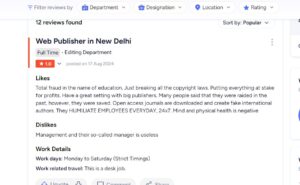Daryaganj-Based ML Books International Accused of Fraudulent Practices, Alleged Collusion with Bookstores

A new scandal is unfolding in the heart of Delhi’s bustling Daryaganj book market, with serious allegations of fraudulent activities surrounding one of its prominent publishers—ML Books International. Known for its diverse range of academic materials, ML Books International, also operating under the alias World Technologies, has found itself at the center of a storm. Owned by brothers Ashish Vaidya and Ayush Vaidya, the company is accused of engaging in deceptive practices that have sent shockwaves through the academic and publishing communities.
The revelations paint a troubling picture of a company exploiting gaps in the market and the academic ecosystem to make significant profits at the expense of students, researchers, and bookstores. While Daryaganj has long been recognized as a hub for booksellers and publishers, recent reports have brought to light the darker side of the industry, including allegations of fraudulent dealings related to books sold to universities in Bihar. However, the new allegations surrounding ML Books International take things a step further, revealing a web of unethical practices designed to manipulate both physical and digital markets.
Repackaging Open-Source Books for Profit
One of the key accusations against ML Books International involves the company’s manipulation of open-source books, a practice that has raised alarms about both the integrity of academic publishing and the exploitation of students. Whistleblowers have come forward, revealing that ML Books International, under its various aliases, has been repackaging free-to-access, open-source books. These books, which are legally available for free or at minimal cost, are allegedly altered using Photoshop to create new covers and presented as “premium editions.”
These so-called “premium” editions are then sold at significantly inflated prices to unsuspecting customers, including students, educational institutions, and bookstores. In some cases, the markup has been reported to be as high as 300% above the original price. The practice not only exploits the availability of open-source materials but also misleads consumers into believing they are purchasing exclusive or higher-quality versions of these books. This unethical approach has stirred outrage among academics and publishers who view the exploitation of open-source books as a violation of the core principles of accessibility and knowledge sharing.
Allegations of Cracking Online Journal Codes
Adding fuel to the fire, ML Books International and World Technologies are also accused of engaging in more severe forms of academic misconduct. Reports from multiple whistleblowers have alleged that the company has been involved in cracking online journal codes to gain unauthorized access to digital content. By circumventing subscription fees, ML Books International has reportedly been able to access and distribute academic journals without paying for them, thereby undermining the business models of legitimate publishers who rely on these subscription fees to fund their operations.
This kind of behavior is not only illegal but also compromises academic integrity. Researchers, students, and institutions rely on legitimate access to journals for their studies, and such practices put the credibility of academic work at risk. The unauthorized distribution of these journals further raises concerns about the erosion of trust in digital academic resources, as it becomes increasingly difficult to differentiate between legitimate sources and illegally obtained content.
Collusion with Bookstores: A Broader Conspiracy?
Another disturbing allegation involves the possibility of collusion between ML Books International and various bookstores in the distribution of its repackaged materials. While some bookstores may have unknowingly become part of this unethical operation, others may have been complicit in knowingly selling the altered books. According to insider reports and online reviews, certain bookstores in Delhi and beyond have been found to stock these repackaged books, unaware or uninterested in their questionable origins.
The role of these bookstores in perpetuating the distribution of altered materials complicates matters further. If the bookstores were indeed complicit in the distribution, this could lead to serious legal and ethical ramifications for both the publishers and the retailers involved. If the bookstores were unknowingly caught in the web of deception, they face the challenge of regaining the trust of their customers, who may now be wary of purchasing books from these outlets.
Operating Under Multiple Names: Evasion of Scrutiny?
One of the more alarming aspects of this scandal is the revelation that ML Books International operates under multiple aliases. The company, which is officially registered as ML Books International, is also reported to be conducting business under other names, including World Technologies. This strategy of operating under various identities is believed to be a deliberate attempt to evade scrutiny and continue the fraudulent practices without being detected by authorities or the public.
By using multiple names, ML Books International and its associated companies can obscure their true business operations and avoid being held accountable for their actions. This tactic raises serious questions about the company’s commitment to transparency and ethical business practices. It also calls into question the effectiveness of current regulatory frameworks in holding publishers and distributors accountable for unethical behavior.

The Impact on the Academic Community
The broader implications of these actions are deeply concerning. The publishing industry, particularly in the academic sector, relies heavily on trust—between publishers, authors, distributors, and consumers. When that trust is broken, the entire system can be undermined. Students, researchers, and universities depend on the availability of accurate, high-quality materials, and the practices alleged against ML Books International threaten to erode this foundation.
Furthermore, these actions highlight the vulnerability of the academic community to exploitation. Students already face exorbitant costs for textbooks and academic resources, and the discovery of fraudulent practices only adds to their burden. Researchers, too, are affected, as they may inadvertently rely on tampered or pirated materials, which can compromise the quality and accuracy of their work.
Legal and Ethical Concerns: The Need for Accountability
The ongoing investigation into ML Books International and its alleged fraudulent practices underscores the urgent need for increased vigilance and accountability within the publishing industry. Publishers, bookstores, and online platforms must work together to ensure that materials are legitimate and fairly priced. Consumers, too, must be more aware of where they purchase their materials and remain skeptical of any offers that seem too good to be true.
As the investigation progresses, there is growing pressure for both legal action and a broader industry response. If the allegations prove to be true, the Vaidya brothers and their associated companies could face severe legal consequences, including charges of fraud and intellectual property theft. However, the bigger question remains: How can the industry as a whole prevent such deceptive practices from taking root in the future?
The case of ML Books International serves as a stark reminder that integrity and transparency must remain at the core of academic publishing. As the academic community awaits further updates, stakeholders are urged to be cautious, stay informed, and demand accountability from all parties involved.















